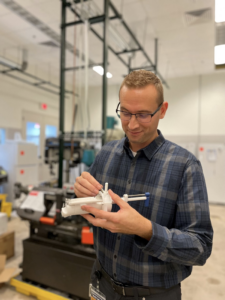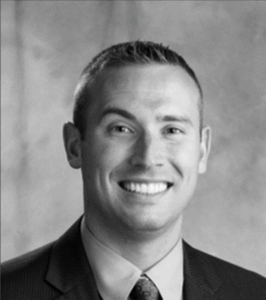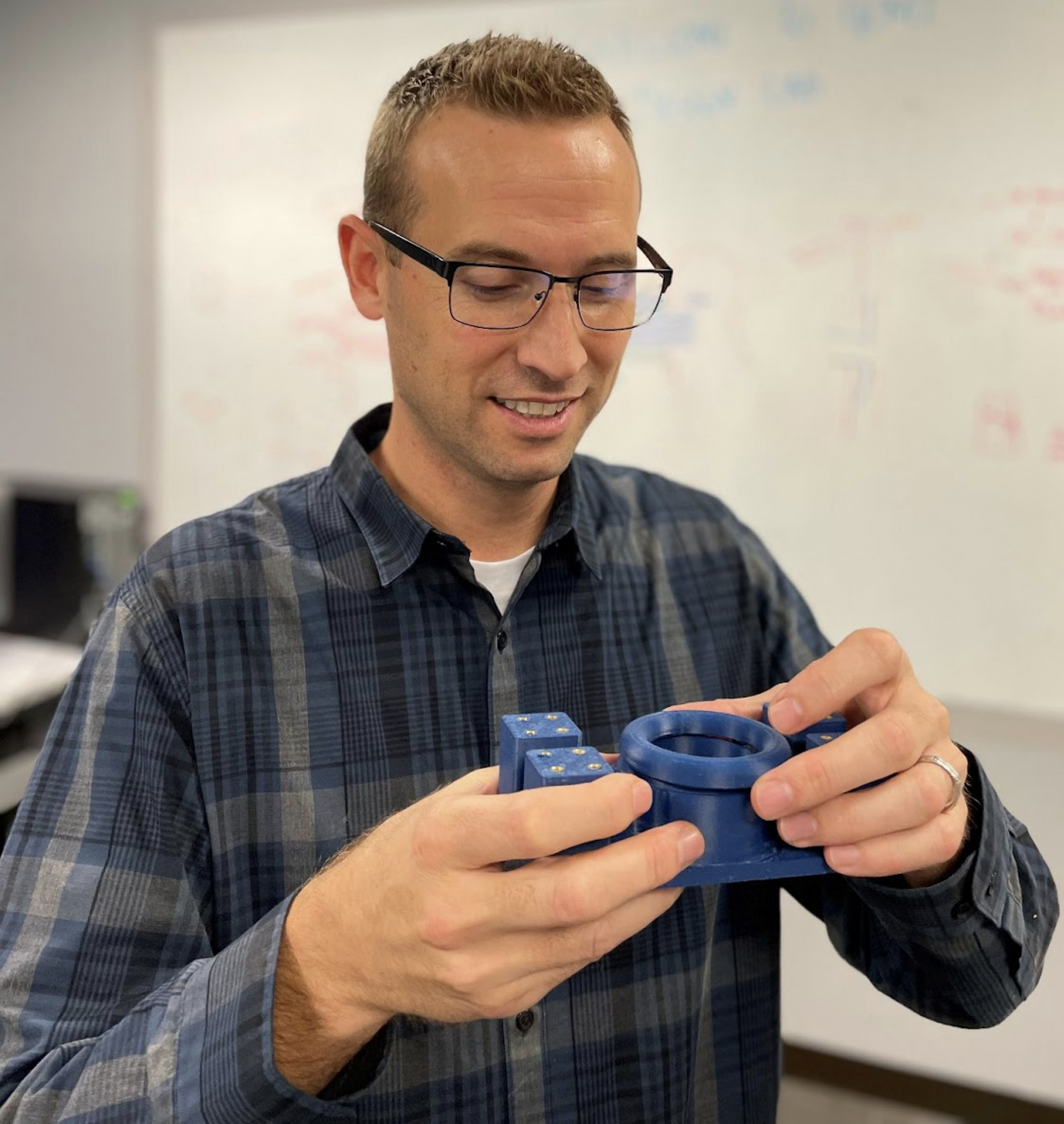So many engineers probably wanted to be an astronaut as kids at some point or another. Saylan Lukas wanted to design roller coasters.
Fortunately for GCMI, our clients and patients benefiting from novel medical technologies, Saylan’s elective in Biomedical Engineering taught by Dr. Sam Hulbert at Rose-Hulman Institute of Technology shifted his career course into biomedical engineering. He earned his undergraduate degree in mechanical engineering and a master’s degree in biomedical engineering from Rose-Hulman Institute of Technology. Dr. Hulbert served as president of the institute from 1976-2004.
“Dr. Hulbert showed me the potential for new medical devices to improve the course of care and lives for countless patients,” Saylan says.
Straight out of school, Saylan dove into medtech design and development as an engineer for Zimmer-Biomet’s patient-matched implant and custom made instrument team, called Rapid Response.
“I had the opportunity to work with many of the world’s best craniofacial surgeons helping to design, develop, and fabricate bone lengthening implants, trauma and cancer-related implants, temporomandibular joints (TMJ), and supporting surgical instrumentation.”
Tenures at Hologic, Cook Medical, and Integra Lifesciences followed his time at Zimmer-Biomet. Those tenures called for contributions to every phase of product development from early stage feasibility and project charter work, to design and development, design verification and validation testing, human factors and usability, risk analysis, manufacturing scale-up, sustaining engineering and root cause analysis.
This work culminated in an assignment for Standard Bariatrics, a start-up company in Cincinnati, OH, as the lead engineer for the development of two balloon catheters and a laparoscopic trocar from concept to 510k approval. Those devices achieved their FDA 510k approval in 2021. Teleflex recently acquired Standard Bariatrics for $170 million.
“Seeing a project through from beginning to end, including all aspects of the design, development, testing, and FDA approval was certainly one of the highlights of my career to that point,” Saylan says.
“When that project wrapped up, we had the opportunity to look around for new opportunities and the potential to be closer to family in the southeast. Search is a powerful tool, and GCMI showed up as a top result when looking for ‘Top rated medical device design firm in Atlanta.’ After connecting with [GCMI Director of Scientific Affairs] Evan Goldberg, PhD it wasn’t long before we were on our way to Atlanta.”
 From student to doer to teacher: an evolutionary medtech journey continues
From student to doer to teacher: an evolutionary medtech journey continues
“At GCMI my work has evolved from a primary contributor to more of a teaching and coaching position. I have been lucky to have had such a wide variety of experiences throughout my career and I enjoy sharing those stories with younger team members, clients and aspiring medtech innovators like the Georgia Tech School of Biomedical Engineering Capstone and CreateX projects to which we advise.
“Since GCMI is an affiliate of Georgia Tech, I now have more opportunities to share the fundamentals and gold standard techniques and tools I learned from industry, to properly design and develop new medical products.
“That said, I always enjoy getting the opportunity to go to surgery and see the products that I have worked on actually be used to positively impact patient’s lives. Medical device product development is such rewarding work since we get to easily see a direct impact that the hard work produces. Since GCMI is a non-profit with close ties to the Children’s Healthcare of Atlanta and the Pediatric Technology Center at Georgia Tech, we have the opportunity to work on pediatric devices, which often suffer from economics related to population size when it comes to profit-focused industry enterprises.
“It has been extremely rewarding to have the opportunity to work on projects that will help children with rare disorders like Dr. Scott Hollister’s 3D printed resorbable airway support device.”
[Editor’s note: GCMI was a significant contributor to, and manufacturer of record for, the first surgery to implant a 3D printed tracheal implant in a pediatric patient in the state of Georgia in 2018.]
The prerequisites for successfully de-risking and commercializing new medical technologies
When asked what should innovators ‘bring with them’ when engaging GCMI to give the project the greatest opportunity for value or success Saylan responded,
- Funding. Medical device product development is expensive and typically requires twice as much money and twice as much time to complete as initially planned. Invests often want to see evidence that innovators have de-risked the project prior to committing to funding new opportunities. GCMI can help generate documentation and functional prototypes that investors or grants are desiring.
- Documentation. If it hasn’t been documented it doesn’t count.
- A strong team and at least one dedicated full-time engineer that can help advance the project from the client’s side.
- An open mind to obtaining 3rd party feedback validating clinical need, voice of the customer and market potential.
- A positive attitude toward FDA, regulations, and documentation. The FDA is much more supportive and eager to advance innovation than many are aware. However, they are still data driven and take safety very seriously.
When asked why should innovators of any and all shapes and sizes consult or engage GCMI for medtech design and development, he said, “We have an excellent team of design and development biomedical engineers and Dr. Emily Blum as our medical director with a wide variety of backgrounds and experience in many different types of medical devices.
“Since GCMI is a non-profit affiliate of Georgia Tech, we take no Intellectual Property, and design products that are agnostic of a specific manufacturing technology (which many design firms do if they have in-house manufacturing capabilities). We also have a vast network of clinical contacts due to our partnership with Emory University and technical experts associated with Georgia Tech.”
The Future of Medtech Innovation: sensors, AI, genetics and bioresorbables
As Saylan recently wrote with Dr. Blum, “It seems like every new medical technology incorporates miniature sensors in its design, such as accelerometers, which are capable of externally sensing and ‘distributing’ vital signs or other data points of interest including breathing sounds, EKG signals or glucose levels, to name just a few.
“In the near future, sensors and associated software, including AI, will be able to tell us more about what’s going on with our bodies than many ever dreamed possible. Beyond sensors and connected devices, cell and gene therapies, along with 3D printed, implantable and bioresorbable devices will continue to evolve and enter patient care.”
- Saylan Lukas, MS-BME, MBA

Saylan Lukas has over 15 years of medical device design and development experience at large multi-national corporations and startup companies. Saylan has led project teams from initial feasibility through global commercialization in areas of patient specific craniomaxillofacial implants and instruments, transcatheter heart-valve stent grafts and delivery systems, cranial stabilization systems, cancer treatment devices, and laparoscopic instruments. Saylan has extensive experience in new technology development, computer aided design, 3D printing and prototype fabrication, design verification and validation testing, human factors and usability, risk analysis, manufacturing scale-up, sustaining engineering, and root cause analysis. He has developed and launched multiple products, achieved several successful 510(k) applications, has been awarded multiple patents and published several technical papers in peer-reviewed journals. Saylan earned his undergraduate and graduate degrees in Mechanical and Biomedical Engineering from Rose-Hulman Institute of Technology and a Master’s in Business Administration from Butler University.
